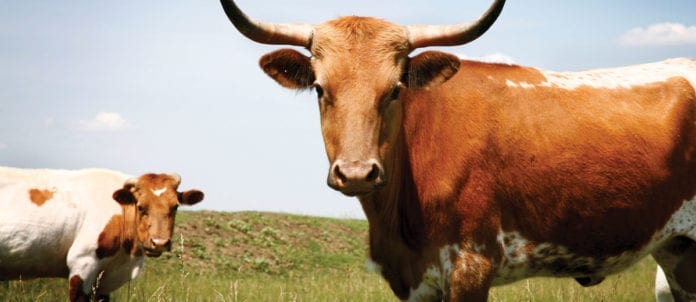There are millions of Canadian consumers who enjoy an omnivorous lifestyle and eat meat regularly. While many point fingers at large-scale meat production as one of the worst environmental culprits, it begs the question: do we produce too much meat in Canada? Are there more ethical ways we can consume animal products?
The 2019 Nourish Trend Report describes a shift in food from plant-based diets towards more “conscious carnivores,” “virtuous consumption” and “ethical protein.” Consumers are starting to believe cutting animal products out of their diets is not necessarily the answer to environmental problems. This shift — combined with new marketing efforts and certification processes within our agricultural industry — has made for interesting arguments as to what exactly constitutes “ethical” meat.
At Modern Steak in Calgary, staying local, sustainable and humane is how owner Stephen Deere has built a successful business. With two locations, Modern Steak is a steakhouse with a difference — instead of buying its steak from a large-scale supplier, it deals directly with three local cattle ranchers.
“We may actually be the only restaurant that has its own bull,” Deere jokes. “We don’t go through [a distributor]; we work directly with the ranchers and we’re on a first-name basis.”
Besides owning a bull that resides at one of the ranches with whom he works, Deere ensures his staff are well-versed in beef production by organizing visits to these ranches.
“We don’t have factory farms here,” Deere explains. “Most of the ranchers we work with have been farming for generations. They understand what their animals need and how best to treat them.”
Although these animals are treated humanely, none of the ranches are certified humane. On Deere’s menu, you can choose from grain-finished or grass-fed beef, Wagyu beef or game (bison and elk). Each type of meat has several steak options, such as the Wagyu Ribeye ($79 with a side dish) or Modern Benchmark Tomahawk (feeds two; $64 per person with two side dishes).
“All our ranchers are currently at less than 100 head of cattle a month,” Deere continues. “These animals have great space to roam; they’re pasture raised. They have the best life in the world and then they have one very short bad day.”
Tamarack Farms, located in Northumberland County, Ont., has taken ethical and sustainable farming to a new level. Producing mutton, lamb, heritage pork and other rare breeds for high-end restaurants, farmers Richard and Nancy Self have proven to be leaders in the practise of ethical animal husbandry in Canada.
We started this farm almost seven years ago,” Nancy Self says. “At the time, it was a bit of a project to rehabilitate the land. We grow all our own hay; we have 14 pastures we rotate our sheep through and an additional six pastures for our heritage-breed pigs. We work collaboratively with chefs because we feel they’re the thought-leaders in food; they can inspire change.”
The concept of Tamarack Farms, which also produces maple syrup, rare herbs, heirloom vegetables and edible flowers, began when Self realized how few farmers were producing food the way she and her family wanted to eat.
“What we’re doing here is closer to bio-dynamic farming, where we control as many variables as possible,” she explains. “At the heart of what we’re doing is to give the livestock a happy, natural life and a peaceful end.”
For Self, giving her livestock a happy life means providing plenty of shelter and never restricting access to pasture, ensuring the lambs she rears have ample time to play and develop socially. She says by allowing a lamb time to grow and develop its flavour, she’s able to provide a superior-tasting product, as well as an ethical one.
“We wanted to raise livestock in the same way we wanted to eat it,” Self continues. “We currently have two animal-welfare certifications on the farm. We haven’t had to make any changes to the way we do things, though — we look for certifications to validate what we already do.”
Anthony Walsh, corporate executive chef of Toronto-based Oliver & Bonacini Hospitality (O&B), has been an avid supporter of Tamarack Farms since its inception. Through regular collaboration, they’ve developed a relationship that allows both parties the freedom and support to maintain the integrity of Tamarack Farms’ meat.
“Anthony has been incredibly supportive of us and the whole concept of what so many farmers are trying to do — which is steward the land,” Self continues. “We’re raising animals and growing food as opposed to just ‘producing meat’.”
Considered one of Canada’s most highly respected chefs and local-food champions, Walsh forged a partnership with Tamarack Farms and started serving its products at flagship O&B restaurants Canoe and Auberge du Pommier in Toronto.
“[Nancy and Richard] put the farm together in three years,” he explains. “There’s a crazy amount of hard work they’ve put into it. The way they do things is fantastic and 100-per-cent ethical — thankfully, at restaurants like Canoe, we can afford to take on their product.”
This partnership has enabled Walsh and the Selfs to bring the farm-to-table movement to a new level — specifically, the continued education and training of the cooks at O&B.
“I’m not sure exactly what started it, but it’s turned into this huge relationship/production/learning centre [for our business],” Walsh continues. “We’re looking to expand on this by having cooks stay during the summer and harvest season, not just to learn, but to help with our understanding of how we can best use [Tamarack’s] product.”
Recently, San Francisco-based restaurant State Bird Provisions collaborated with Canoe on a tasting menu after spending time together at Tamarack.
“We went up [to Tamarack Farms] and spent the day with them,” Walsh says. “Then we did a tasting menu at Canoe and I featured Tamarack Farms’ mutton (pasture-raised mutton with parsnip, cattail and pomegranate) — these guys freaked out about the taste; about the whole operation. From a palate standpoint, the mutton is beautiful and knowing how these animals are treated means a lot to us.”
Those in the know agree while the small-scale, holistic approach to farming is the dream, more often than not the reality is a lot larger in scale and practicality. We are, however, much closer to knowing exactly how sustainably our beef is produced — thanks to a certification program developed by the Calgary-based Canadian Roundtable for Sustainable Beef (CRSB), as well as the McDonald’s Beef Sustainability Program.
The CRSB-certification requirements are aligned under the Five Principles of Sustainable Beef, which were created by the Global Roundtable for Sustainable Beef in 2013. Though new, this certification is promising for the creation of a standard for beef farming in Canada.
“There’s crossover for sure [between sustainable beef and ethical meat],” Andrea White, Community Engagement manager at CRSB says. “The lion’s share of Canadian beef producers are really concerned about animal welfare — it’s their first priority. They also really care about the environment, which all ties into that economic liability — they need to take care of the land or they’re not going to have it.”
McDonald’s Canada, which was involved in the Global Roundtable for Sustainable Beef, was instrumental in getting the CRSB’s certification going, following two to three years of development. Now, the program certifies farms, ranchers and processing facilities to sustain a standard for beef production in all areas.
White says the program’s aims are three-fold. “The certification is helping our producers and processors demonstrate they have sustainable practices in their operations,” she explains. “It’s also supporting the foodservice industry in meeting its goals and commitments in relation to sustainability. Finally, the certification is providing assurances to consumers about what beef sustainability means and how the beef is raised.”
McDonald’s now features the CRSB Certification Mark on its line of Angus Burgers and 30 per cent of its Angus beef now comes from CRSB-certified farms, with an aim of increasing that amount.
Jeffrey Fitzpatrick-Stilwell, senior manager for North America Sustainability operations at McDonald’s Canada, says he works directly with farmers and the CRSB to tell the story of Canadian sustainable beef.
“The McDonald’s Beef Sustainability program is global, but it started in Canada,” Fitzpatrick-Stilwell explains. “It took the principles from the Global Roundtable for Sustainable Beef and applied them in a locally relevant way, because the way sustainable farming works in one country will be different in another.”
Working directly with Canadian beef farmers, McDonald’s started its pilot program in 2013 by asking ranchers to volunteer to be audited and certified. The first to volunteer was cattle rancher Stephen Hughes, who owns Chinook Ranch in Longview, Alta. Hughes raises a herd of more than 500 mixed Angus beef cows on his 5,500-acre property, where his family has been farming for three generations.
“I set out 23 years ago to start grazing year-round,” he says. “Because of the Chinooks we get through the winter, we can graze our cows on native roughage when the patches of snow melt. Of course, we supplement where necessary, but the basis of our operation is the native species of grass supporting our cows through the winter.”
Hughes volunteered to be audited by the McDonald’s pilot program because he felt he had nothing to hide. “I thought, if I can’t pass this thing with flying colours, either [McDonald’s] is out to lunch or I’m out to lunch,” he laughs.
Hughes has been working with McDonald’s ever since, most recently featuring in its sustainable-beef ad campaign.
“When I was audited, they came up from Colorado,” he explains. “It was an afternoon I’ll never forget because, yes, it was an audit, but it was also a reminder for me as to why I do what I do.”
Chinook Ranch is not certified under an animal-welfare group, but its sustainable-beef certification ensures the animals are treated with respect, given space and utmost care.
“I’m proud to be part of the sustainable-beef movement,” he says. “It’s important for [farmers] to be willing to tell our story; it’s important that we’re verified by an outside body. Consumers want proof and we all want credibility and transparency.”
Written by Janine Kennedy


















